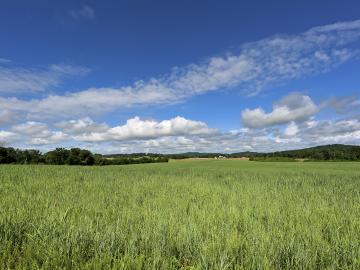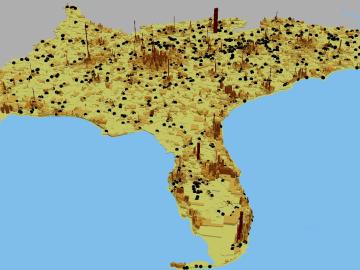
Filter News
Area of Research
- Advanced Manufacturing (2)
- Biology and Environment (22)
- Computational Engineering (1)
- Computer Science (2)
- Energy Science (43)
- Fusion and Fission (2)
- Isotopes (3)
- Materials (29)
- Materials for Computing (6)
- National Security (11)
- Neutron Science (13)
- Nuclear Science and Technology (3)
- Quantum information Science (1)
- Supercomputing (41)
News Type
News Topics
- (-) Biomedical (17)
- (-) Clean Water (2)
- (-) Computer Science (63)
- (-) Environment (38)
- (-) Frontier (16)
- (-) Molten Salt (3)
- (-) Polymers (13)
- 3-D Printing/Advanced Manufacturing (48)
- Advanced Reactors (12)
- Artificial Intelligence (35)
- Big Data (8)
- Bioenergy (25)
- Biology (26)
- Biotechnology (10)
- Buildings (15)
- Chemical Sciences (35)
- Composites (12)
- Coronavirus (17)
- Critical Materials (11)
- Cybersecurity (17)
- Education (3)
- Element Discovery (1)
- Energy Storage (43)
- Exascale Computing (13)
- Fossil Energy (1)
- Fusion (17)
- Grid (16)
- High-Performance Computing (32)
- Isotopes (20)
- ITER (2)
- Machine Learning (13)
- Materials (60)
- Materials Science (56)
- Mercury (2)
- Microelectronics (1)
- Microscopy (17)
- Nanotechnology (29)
- National Security (18)
- Neutron Science (54)
- Nuclear Energy (28)
- Partnerships (31)
- Physics (26)
- Quantum Computing (13)
- Quantum Science (31)
- Security (12)
- Simulation (10)
- Space Exploration (3)
- Statistics (1)
- Summit (22)
- Transportation (26)
Media Contacts

Nearly a billion acres of land in the United States is dedicated to agriculture, producing more than a trillion dollars of food products to feed the country and the world. Those same agricultural processes, however, also produced an estimated 700 million metric tons of carbon dioxide equivalent in 2018, according to the U.S. Department of Agriculture.

Pengfei Cao, a polymer chemist at ORNL, has been chosen to receive a 2021 Young Investigator Award from the Polymeric Materials: Science and Engineering Division of the American Chemical Society, or ACS PMSE.

Researchers at ORNL have developed a robotic disassembly system for spent electric vehicle battery packs to safely and efficiently recycle and reuse critical materials while reducing toxic waste.

Six science and technology innovators from across the United States will join the fifth cohort of Oak Ridge National Laboratory’s Innovation Crossroads program in June.

The Department of Energy’s Oak Ridge National Laboratory has licensed its award-winning artificial intelligence software system, the Multinode Evolutionary Neural Networks for Deep Learning, to General Motors for use in vehicle technology and design.

The U.S. Department of Energy’s Innovative and Novel Computational Impact on Theory and Experiment, or INCITE, program is seeking proposals for high-impact, computationally intensive research campaigns in a broad array of science, engineering and computer science domains.

An analysis published in the Proceedings of the National Academy of Sciences and led by researchers from the U.S. Department of Energy’s Oak Ridge National Laboratory has received the 2021 Sustainability Science Award from the Ecological Society of America.

Using complementary computing calculations and neutron scattering techniques, researchers from the Department of Energy’s Oak Ridge and Lawrence Berkeley national laboratories and the University of California, Berkeley, discovered the existence of an elusive type of spin dynamics in a quantum mechanical system.

A rare isotope in high demand for treating cancer is now more available to pharmaceutical companies developing and testing new drugs.

Scientists have found new, unexpected behaviors when SARS-CoV-2 – the virus that causes COVID-19 – encounters drugs known as inhibitors, which bind to certain components of the virus and block its ability to reproduce.


